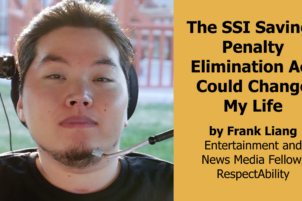
Suad Bisogno
RespectAbility is proud to be a member of the Association of People Supporting Employment First (APSE), a national organization that promotes the importance of community-integrated employment for people with disabilities. In early June, Wally Tablit, Senior Director for Leadership and Workforce Development, and I attended APSE’s annual conference in Columbus, Ohio, where we met with leaders from across the country. After the conference, I was able to follow up with APSE board member and disability employment leader, Suad Bisogno, CEO of Integrated Resources Institute. Explore our conversation about employment first policy and some of the crucial issues facing Suad’s home state of California.
JIMMY: Can you introduce yourself, the work you do related to improving outcomes for people with disabilities, and what led you to do this work?
SUAD: My name is Suad Bisogno, and I am the CEO of Integrated Resources Institute (IRI), a nonprofit dedicated to the full inclusion of people with disabilities. We believe that employment is the most effective way in having people with disabilities included and embraced as contributing members of their communities. IRI has facilitated the employment of over 20,000 people with disabilities and have, over and over, seen the power that employment can play in the quality of life of a person with a disability, and positive impacts it makes for employers/community. And I’m not talking about charity. Employers genuinely love having a person we connected with their employment site because they were the right match, with the right skills and the right attitude. Dating back to 1987, IRI has been on the forefront of advocating competitive integrated employment (CIE), and I am honored to continue to support this cause. I also sit on the California APSE board and a lot has been done over the course of the past several years to work with State entities in ensuring that Employment 1st remains in the forefront. It continues to be extremely important now as our service system is required to be HCBS compliant, and CIE is 100% HCBS compliant.
JIMMY: We met for the first time at the APSE Conference in Ohio this month. What are the key reasons it is so essential to support employment first as a solution for economic independence for people with disabilities?
SUAD: I’m sure I can drop data here that shows why employment first is a solution for economic independence for people with disabilities (the Journal for Vocational Rehabilitation would be a good place to start) but I’d rather share stories. We have, repeatedly, supported people that have been considered unemployable by someone/some institution at some point in their life. We help them get jobs/careers. We have seen their quality of life improve. We have seen their self-advocacy improve. And we have seen them move out of their current living arrangements (family, group home) and into their own apartments. We have seen them build meaningful relationships, get married, have children. Does this sound oddly familiar? It should, because this is everyone’s story. We all get this opportunity through the power of employment. But people with disabilities constantly face hurdles to accessing what everyone so easily has access to. But more importantly, the biggest hurdle is living in a world that has no expectation of you to have this experience. So, we believe EVERYBODYWORKS.
JIMMY: What are the key issues from your perspective facing people with disabilities in California?
SUAD: We have many issues that impact people with disabilities access to competitive integrated employment. We recently made a flowchart showing the challenges people with intellectual and developmental disabilities face in accessing CIE. Our service system is designed to be an “opt in” to employment, vs an “opt out” of employment. And when you “opt in” to employment, you will see the hurdles and waiting that happens. Many people and families choose to instead look at alternatives such as day programs.
But as a provider, I continuously will highlight the issue with the provider community. I see ourselves as champions and advocates for those with disabilities – a place where someone can come to and ask for support to work and we see them for their gifts and abilities, celebrate them and get them the jobs/careers of their choosing. We aren’t perfect but we try our hardest. And when we fall short, we fall short together, and get back to figuring it out together.
Most adult providers are still in the institutional model mindset. They believe that people with disabilities need to be “fixed” and create services/programs that are tiered and you only get to advance to the next tier if you meet the program requirements. For example: a provider has a day program, work training and employment program. You have to start off at their day program, then you get to graduate to their work training program (where sometimes you spend another 2 years “training”) and then you can potentially “graduate” to their employment program. The people that make it to the employment program are cherry picked and the others are told, without using the exact words, that they are unemployable. We have had people come to us after 5 years going through these services wanting a job to only be told they need more “training before they become work ready”. And though we have come a long way and HCBS is requiring that all services and programs be community integrated and that people have choice, many providers are just making sure their paperwork is in compliance with regulation, while still operating the way they have for a very long time. Change is hard and many of the adult service providers don’t see what they are doing could be better or different. Rather they see “happy” people going to their programs and “happy” employees reporting to work.
JIMMY: Is there anything else that you would like to share or highlight about your work?
SUAD: This work isn’t done alone. It is done in partnership with other advocates, organizations, and businesses. APSE continues to need people, with all different types of skills and gifts to support the mission and cause. Support APSE and become a member today: https://apse.org/membership/








Wow, this is amazing! IRI is a great place to be!